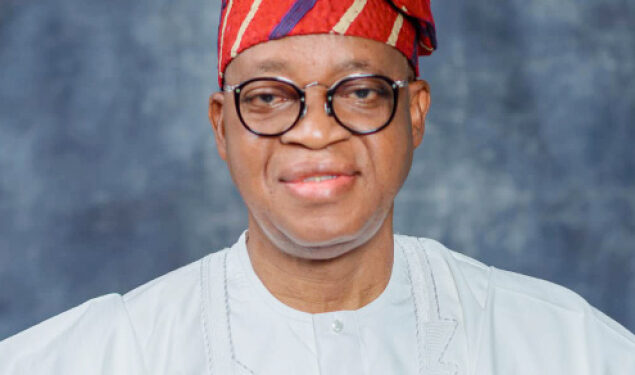Nigeria is planning to re-establish a National Carrier through a Public-Private Partnership, says the minister of Marine and Blue Economy, Adegboyega Oyetola.
The minister disclosed this at the 7th edition of the Taiwo Afolabi Annual Maritime Conference held in Lagos titled, ‘Blue Innovations: The Sustainable Impact of Infrastructure Development and Modernisation.’
The minister, who was represented by the Director of Maritime Services in the ministry, Mercy Ilori, disclosed that the long-awaited Cabotage Vessel Financing Fund (CVFF) is nearing disbursement.
Oyetola also affirmed that Nigeria was stepping up efforts to secure its waterways and position itself as a regional maritime powerhouse, strengthening naval security and positioning Nigeria as a leading force in the global Blue Economy.
The minister described Nigeria’s anti-piracy success as a significant milestone, credited to the Deep Blue Project and coordinated maritime surveillance efforts.
“This achievement has restored international confidence and bolstered regional maritime stability,” he said.
Oyetola said the newly approved National Policy on Marine and Blue Economy provides a structured roadmap to harness Nigeria’s marine potential. The policy integrates port infrastructure, aquaculture, maritime security, biotechnology, renewable energy, and ocean governance.
“This policy marks a turning point in our journey to unlock economic opportunities in our marine sector,” the minister said.
According to him, the government has commenced major infrastructural upgrades, with the reconstruction of Apapa and Tin Can Island Ports approved under the Western Port Rehabilitation Programme. Procurement processes for Eastern Ports are also in progress.
“These upgrades, along with digital innovations like the Port Community System and E-Call-Up technology, will significantly reduce port delays and enhance investor confidence,” he added.
“We are structuring the process to ensure transparency and compliance. This fund will expand opportunities for indigenous operators,” Oyetola assured.
He alluded that, as part of safety and public trust-building measures, the ministry has distributed over 42,000 life jackets nationwide, procured new ferries and patrol boats, and strengthened inland waterways oversight.
These efforts are already reducing boat mishaps and restoring public trust in water transport, he said.
He further noted progress in automating licensing systems and reviving disused fishing terminals to support food security and empower rural communities.
He asserted that Nigeria is taking the lead in establishing the Regional Maritime Development Bank, headquartered in Abuja, aimed at financing maritime infrastructure and deepening integration across West and Central Africa.
Speaking earlier, the chairman of SIFAX Group, Dr. Taiwo Afolabi advocated for an overhaul of infrastructure at the country’s seaports.
Afolabi noted that, the provision of the relevant infrastructure at ports across the country was the bedrock of an efficient port system that will tap into the enormous potential of the country’s maritime industry.
He said: “Nigeria’s blue economy is a sleeping giant. We have untapped potential along our vast coastline that, if harnessed responsibly, can create new jobs, strengthen our ports, attract investments, and safeguard our environment for future generations.
“Infrastructure is at the heart of this transformation. Modern, resilient, and sustainable infrastructure will drive efficiency and competitiveness in our ports and maritime corridors.”



